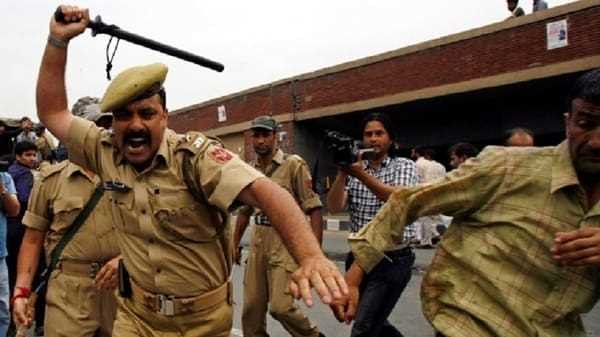- About
- Topics
- Picks
- Audio
- Story
- In-Depth
- Opinion
- News
- Donate
- Signup for our newsletterOur Editors' Best Picks.Send
Read, Debate: Engage.
| topic: | Islamophobia |
|---|---|
| located: | India |
| editor: | Hanan Zaffar |
Bulldozers have become a symbol with very contrasting meanings in India today. While for the ruling Hindu nationalist Bharatiya Janata Party (BJP) and its supporters, the new trend of demolition of Muslim homes by bulldozers signify justice against perpetrators of violence, for critics of the government it is the latest tool for the government’s blatant attacks against Muslims.
In what is being viewed as growing intolerance and discrimination against the Muslim minority in India, the government has bulldozed numerous “illegal” houses belonging to Muslims over the last few months in response to “spreading violence.” However, this argument does not appear consistent with the government's response to the ongoing protests against the new controversial army recruitment scheme in which protestors torched rails, blocked roads and destroyed public property.
To spell out the context, in the last few weeks, India has seen two different types of protests, and the government's response to each has been starkly different. While the protests by Muslims against derogatory remarks directed at the Prophet Mohammad by a BJP spokesperson were met with the demolition of Muslim homes, the second, against the new army hiring scheme, did not elicit the same violent response. This is despite the fact that demonstrations against the army recruitment scheme were extremely violent compared to the largely peaceful protests by the minority Muslim community. While the Muslim protestors were termed “rioters” by the government and dealt with an iron stick, including the demolition of their properties, those protesting against the army hiring scheme were euphemistically called “misled” or “misinformed” youngsters.
The government's actions in this case also did not include the demolition of any houses belonging to the purported perpetrators of the violence, indicating that bulldozers are specific to Muslim protesters. This is just one example of what many view as India's growing institutionalised discrimination against Muslims and their treatment as second-class citizens.
In India, growing intolerance towards Muslims has been widely observed since the Hindu right-wing BJP came to power in 2014. In its report last year, the US Commission on International Religious Freedom (USCIRF) recommended that India be designated as a "country of particular concern" since "the government, led by the BJP, promoted Hindu nationalist policies that resulted in systematic, ongoing, and egregious violations of religious freedom." The report cited numerous examples of governments' deliberate discrimination and vilification of Muslims.
The country has seen a steady rise of anti-Muslim rhetoric, as well as hate crimes against the minority that comprises more than 200 million people. While anti-Muslim sentiments have risen dramatically across the country, the government and its allies appear to be only adding fuel to the fire as the approach appears to be politically beneficial for the ruling party. The passing of a controversial citizenship law, which grants citizenship to people of different religions from neighbouring countries except Muslims; the rise of anti-minority rhetoric based on prejudices such as Love Jihad - a notion that Muslims lure Hindu girls with an intention of converting them to Islam; and the recent decision to prohibit Muslim women from attending university while wearing hijabs (Islamic scarves) in the BJP-ruled state of Karnataka are all examples of this.
The levelling of Muslim homes now appears to be the recent addition to the government's toolkit of persecution. The demolitions first began following tensions and subsequent clashes between Muslims and the majority community during the Hindu festival season earlier this year. Authorities bulldozed numerous homes belonging to the Muslim community as a punishment for allegedly “causing violence,” despite many people’s disbelief in the action’s legal validity.
Acknowledging the government excesses, the United Nations Special Rapporteurs in their recent letter to the Indian government condemned the demolition of Muslim houses and referred to the new trend as a “collective punishment” to the minority community. As it stands today, the view is largely echoed by an overwhelming majority of government critics and opposition, as well as members of the Muslim community.
Photo by Ruslan Khadyev

